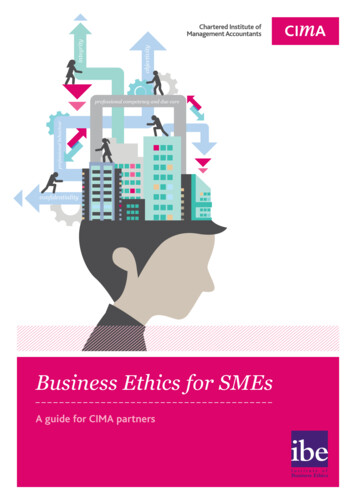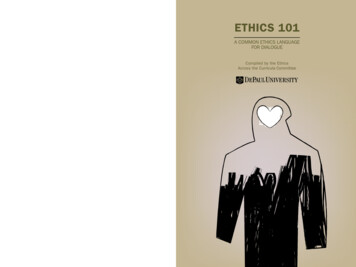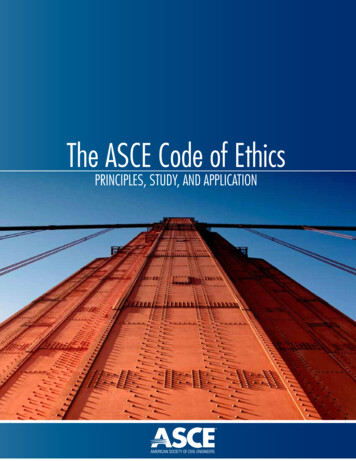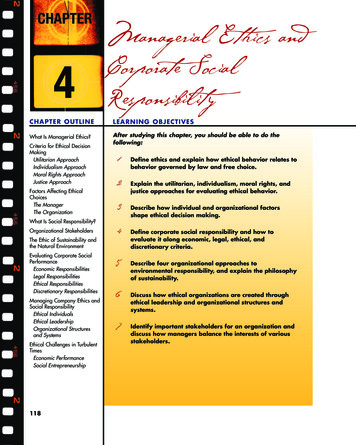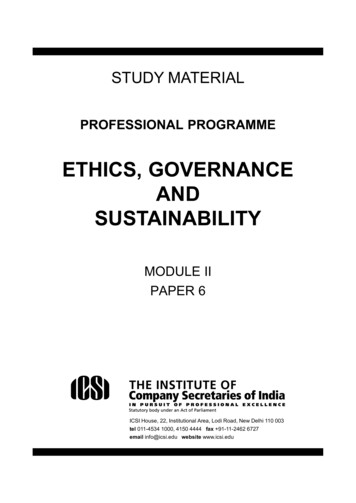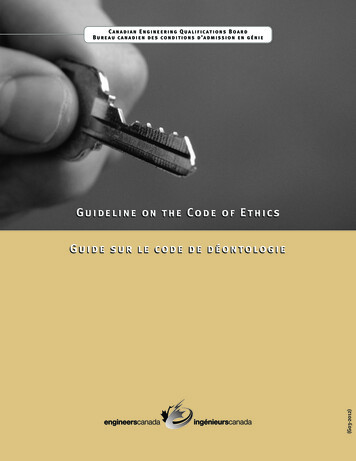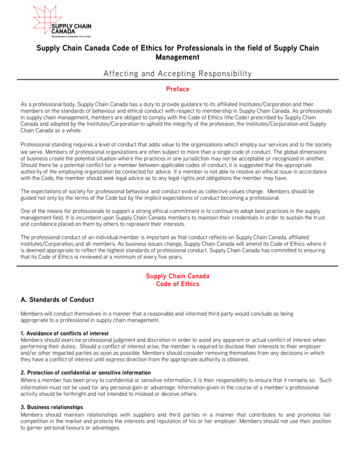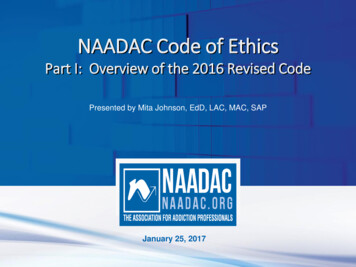
Transcription
NAADAC Code of EthicsPart I: Overview of the 2016 Revised CodePresented by Mita Johnson, EdD, LAC, MAC, SAPJanuary 25, 2017
Thomas Durham, PhDDirector of TrainingNAADAC, the Association for Addiction Professionalswww.naadac.orgtdurham@naadac.org
Produced ByNAADAC, the Association for Addiction Professionalswww.naadac.org/webinars
www.naadac.org/webinars
www.naadac.org/codeofethicswebinar-part1
CE CertificateCost to Watch:FreeCE HoursAvailable:1 CEsCE Certificate forNAADACMembers:FreeCE Certificate forNon-members: 15To obtain a CE Certificate for the time you spent watchingthis webinar:1.Watch and listen to this entire webinar.2.Pass the online CE quiz, which is posted atwww.naadac.org/codeofethicswebinar-part13.If applicable, submit payment for CE certificate or joinNAADAC.4.A CE certificate will be emailed to you within 21 days ofsubmitting the quiz.
Using GoToWebinar – (Live Participants Only) Control Panel Asking Questions Audio (phone preferred) Polling Questions
Webinar PresenterMita Johnson, EdD, LAC, MAC, SAPNAADAC Ethics Committee Chairmitamjohnson@gmail.comCore FacultyYour Walden University
Webinar Objectives1. Define: Code of Ethics2.3.4.5.6.7.8.Explain need for a Code of EthicsDescribe who is covered by this CodeDefine what are standards of practiceDefine what constitutes ethical practiceIntroduce Ethical Decision Making ModelIntroduce the new Code and 9 Guiding PrinciplesHighlight key aspects of Principle I and II
We are accountable Addiction Professionals understand and accepttheir responsibility to ensure the safety andwelfare of their client, and to act for the goodof each client while exercising respect,sensitivity, and compassion.Providers shall treat each client with dignity,honor and respect, and act in the best interestof each client.
Code of Ethics A Code of Ethics is a written set of guidelines –developed, published and regularly revised byNAADAC – that guides its organization andmembers. The NAADAC/NCC AP Code of Ethics providesin-depth and clear guidance and direction tothose who work directly or indirectly withpeople struggling with substance use oraddictive behavior disorders.
The Scope of the Codethe counseling relationship confidentiality and privileged communication boundaries of practice professional responsibilities workplace standards needs in a culturally diverse world clinical supervision e-therapy, e-supervision and social media
Who is covered by Code? The NAADAC Code of Ethics provides guidanceand direction to individual providers, serviceorganizations, state or other regulatoryboards, credentialing bodies, educators andtrainers, legislators, and other related parties. When a ethical complaint is filed withNAADAC, the Ethics Committee uses the Codeof Ethics to determine if a principle as beenviolated and what actions need to be taken.
Standards of Practice Standards of practice include those methods ortechniques that are generally accepted as bestpractices for working with our population. Standards of practice are embedded in the Code ofEthics to deliver and maintain the highest level ofcare and to provide standards that can be used forself-assessment and corrective action. The Code of Ethics are used by the Ethics Committeeto determine how to act on ethical complaintssubmitted.
Ethical and Effective Clinicians identify with people rather than with thingshas a capacity to self-regulateis warm and accessibleinspires confidence and trsutdisplays maturityis self-actualizedis high-functioningcares deeply about othersis compassionate and empatheticadvocates to remedy injustices
Components of Ethical Practice awareness of one’s self and one’s valuesawareness of cultural experiences and its influenceability to engage in critical thinking skillsability to analyze one’s own feelingsability to be a model and influenceability to be altruistic, empathetic, compassionateownership of strong personal ethical principlesability to take responsibility for one’s own actionsability to serve as a catalyst for empowerment
Ethical Decision-Making Model1.2.3.4.5.6.7.8.9.Identify the problem. Engage supervision/consultation.Determine the nature and dimensions of the dilemma.Determine which Principles of the NAADAC Code of Ethicsapply.Generate list of potential courses of action.Determine the potential benefits and risks of each optionunder consideration.Evaluate and choose the identified course of action.Implement the course of action.Assess the outcome of the action.Make adjustments or start over if necessary.
Time for an update NAADAC and NCC-AP revised the Code of Ethics toaddress changes in how services are being deliveredand by whom. The revised Code went into fullimplementation on October 9, 2016. Changes reflect: the internet has changed how we do business, cultural humility is the expectation –microaggressions are not acceptable, boundaries are more permeable, the DSM-5 has expanded into addictive behaviorsand not just substance use disorders, and confidentiality concerns are multidimensional.
Revised Code of Ethics - Introduction:Inherent Values of A Clinician AutonomyConscientious vementRestitution scretionNon-malfeasanceSelf-Interest
New Code: October 9, 2016 IntroductionPrinciple I: The Counseling RelationshipPrinciple II: Confidentiality and PrivilegedCommunicationPrinciple III: Professional Responsibilities andWorkplace StandardsPrinciple IV: Working in a Culturally DiverseWorld
New Code: October 9, 2016 Principle V: Assessment, Evaluation, andInterpretation Principle VI: e-Therapy, e-Supervision andSocial Media Principle VII: Supervision and Consultation Principle VIII: Resolving Ethical Concerns Principle IX: Publication and Communication
Principle I:The Counseling Relationship Client welfare, advocacy Informed consent, disclosures, limits of confidentiality Diversity, discrimination, mandated clients Boundaries, dual relationships, previous relationships Treatment planning, referrals, level of care Documentation, withholding records or reports Termination, coverage, abandonment Self-referrals, commissions, enterprises Bartering, gifts
Principle II:Confidentiality & Privileged Communication Confidentiality Documentation, access, sharingDisclosures, privacy, limits of confidentialityImminent dangerCourtsMultidisciplinary care, sharing informationLocation, payers, encryptionRecording, storage and disposal, transfer of recordsInfectious diseasesTermination
Questions and CommentsWe welcome your questions and comments.
Thank You!Mita Johnson, EdD, LAC, MAC, SAPNAADAC Ethics Committee Chairmitamjohnson@gmail.comYourCore FacultyWalden University
www.naadac.org/codeofethicswebinar-part1
Cost to Watch:FreeCE HoursAvailable:1 CEsCE Certificate forNAADACMembers:FreeCE Certificate forNon-members: 15CE CertificateTo obtain a CE Certificate for the time you spentwatching this webinar:1.Watch and listen to this entire webinar.2.Pass the online CE quiz, which is posted atwww.naadac.org/codeofethicswebinar-part13.If applicable, submit payment for CE certificateor join NAADAC.4.A CE certificate will be emailed to you within 21days of submitting the quiz.
Upcoming WebinarsMarch 8, 2017February 9, 2017Diathesis Stress Model of Addiction:Etiology of Substance-Related andAddictive Disordersby DarryI InabaImproving Retention, Outcomes andSupervision with PCOMSBy George BrauchtMarch 22, 2017February 22, 2017NAADAC Code of Ethics, Part 2by Mita Johnsonwww.naadac.org/webinarsSix Types of Sex Use Disorderby Douglass Weiss
www.naadac.org/webinarsFree CEs aadac.org/join
WEBINAR SERIESOver 75 CEs of free educationalwebinars are available. Educationcredits are FREE for NAADACmembers.INDEPENDENT STUDYCOURSESEarn CEs at home and at your ownpace (includes study guide andonline examination).CONFERENCESMAGAZINE ARTICLESIn each issue of Advances inAddiction & Recovery, NAADAC'smagazine, one article is eligible forCEs.FACE-TO-FACE SEMINARSNAADAC offers face-to-faceseminars of varying lengths in theU.S. and abroad.NAADAC Annual Conference,September 22-26, 2017, Denver, COCERTIFICATE PROGRAMSDemonstrate advanced educationin diverse topics with the NAADACCertificate Programs.
Contact Us!NAADACorgNAADAC44 Canal Center Plaza, Suite 301Alexandria, VA 22314phone: 703.741.7686 / 800.548.0497fax: 703.741.7698 / AADAC
Free CE Hours Available: 1 CEs CE Certificate for NAADAC Members: Free CE Certificate for . of each client while exercising respect, sensitivity, and compassion. Providers shall treat each client with dignity, honor and respect, and act in
